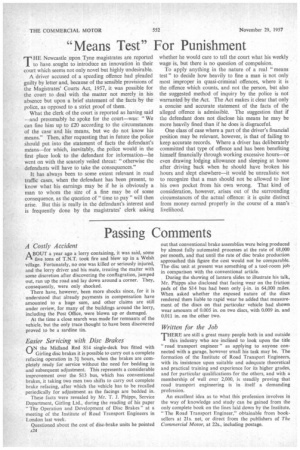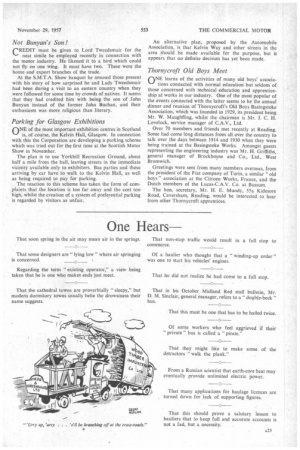Passing Comments
Page 26

Page 27

If you've noticed an error in this article please click here to report it so we can fix it.
A Costly Accident
ABOUT a year ago a lorry containing, it was said, some five tons of T.N.T. took fire and blew up in a Welsh village. Fortunately, no one was killed or seriously injured, and the lorry driver and his mate, treating the matter with some discretion after discovering the conflagration, jumped out, ran up the road and lay down around a corner. They, consequently, were only shocked.
There have, however, been more shocks since, for it is understood that already payments in compensation have amounted to a huge sum, and other claims are still under review, for many of the buildings around the lorry, including the Post Office, were blown up or damaged.
At the time a close search was made for remnants of the vehicle, but the only trace thought to have been discovered proved to be a sardine tin.
Easier Servicing with Disc Brakes
nN the Midland Red S14 single-deck bus fitted with
Girling disc brakes it is possible to carry out a complete refacing operation in 3i. hours, when the brakes are completely ready for service without the need for bedding in and subsequent adjustment. This represents a considerable improvement over the S13 bus, which has conventional brakes, it taking two men two shifts to carry out complete brake refacing, after which the vehicle has to be recalled periodically for adjustment as the facings are bedded in.
These facts were revealed by Mr. T. J. Phipps, Service Department, Girling Ltd., during the reading of his paper "The Operation and Development of Disc Brakes" at a meeting of the Institute of Road Transport Engineers in London last week.
Questioned about the cost of disc-brake units he pointed A24
out that conventional brake assemblies were being produced by almost fully automated processes at the rate of 68,000 per month, and that until the rate of disc brake production approached this figure the cost would not be comparable. The. disc unit at present was something of a tool-room job in comparison with the conventional article.
During the showing of lantern slides to illustrate his talk, Mr. Phipps also disclosed that facing wear on the friction pads of the S14 bus had been only +-in. in 64,000 miles. When asked whether the exposed nature of the discs rendered them liable to rapid wear he added that measurement of the discs on that particular vehicle had shown wear amounts of 0.005 in. on two discs, with 0.009 in. and 0.011 in. on the other two.
Written for the Job
THERE are still a great many people both in and outside A this industry who are inclined to look upon the title "road transport engineer" as applying to anyone connected with a garage, however small his task may be. The formation of the Institute of Road Transport Engineers, with its insistence upon suitable and adequate theoretical and practical training and experience for its higher grades, and for particular qualifications for the others, and with a membership of well over 2,000, is steadily proving that road transport engineering is 'in itself a demanding profession.
An excellent idea as to what this profession involves in the way of knowledge and study can be gained from the only complete book on the lines laid down by the Institute, "The Road Transport Engineer," obtainable from booksellers at 21s. net, or direct from the publishers of The Commercial Motor, at 22s., including postage.
Not Bunyan's Son!
CREDIT must be given to Lord Tweedsmuir for the neat simile he employed recently in connection with the motor industry. He likened it to a bird which could not fly on one wing. It must have two. These were the home and export branches of the trade.
At the S.M.T.A. Show banquet he amused those present with his story of how surprised he and Lady Tweedsmuir had been during a visit to an eastern country when they were followed for some time by crowds of natives. It seems that they had credited him with being the son of John Bunyan instead of the former John Buchan, and their enthusiasm was more religious than literary.
Parking for Glasgow Exhibitions
nNE of the most important exhibition centres in Scotland is, of course, the Kelvin Hall, Glasgow. In connection with this the Corporation are developing a parking scheme which was tried out for the first time at the Scottish Motor Show in November.
The plan is to use Yorkhill Recreation Ground, about half a mile from the hall, leaving streets in the immediate vicinity available only to exhibitors. Bus parties and those arriving by car have to walk to the Kelvin Hall, as well as being required to pay for parking.
The reaction to this scheme has taken the form of complaints that the lOcation is too far away and the cost too high, whilst the creation of a system of preferential parking is regarded by visitors as unfair. An alternative plan, proposed by the Automobile Association, is that Kelvin Way and other streets in the area should be made available for the purpose, but it appears that no definite decision has yet been made.
Thornycroft Old Boys Meet
ONE learns of the activities of many old boys' associa
tions connected with normal education but seldom of those concerned with technical education and apprenticeship at works in our industry. One of the most popular of the events connected with the latter seems to be the annual dinner and reunion of Thornycroft's Old Boys Basingstoke Association, which was founded in 1929, its president being Mr. W. Maughfling, whilst the chairman is Mr. J. C. H. Lovelock, service manager of C.A.V., Ltd.
Over 70 members and friends met recently at Reading. Some had come long distances from all over the country to talk over the days between 1914 and 1930 when they were being trained at the Basingstoke Works. Amongst guests representing the engineering industry was Mr. H. Griffiths, general manager of Brockhouse and Co., Ltd., West Bromwich.
Greetings were sent from many members overseas, from the president of the Fiat company of Turin, a similar "old boys" association at the Citroen Works, France, and the Dutch members of the Lucas-C.A.V. Co. at Bussum.
The hon. secretary, Mr. H. E. Mundy, 55a Kidmore Road, Caversham, Reading, would be interested to hear from other Thornycroft apprentices.




























































































